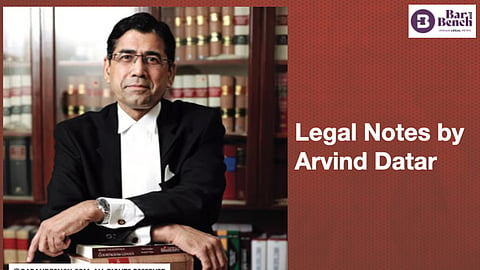
- Latest Legal News
- News
- Dealstreet
- Viewpoint
- Columns
- Interviews
- Law School
- Legal Jobs
- हिंदी
- ಕನ್ನಡ

The Gannon Dunkerley test to interpret the scope of words in a legislative entry has been applied for over 65 years. However, while interpreting the meaning of the word “intoxicating liquor” in Entry 8 of List II, the Supreme Court diluted this test and has subjected it to three restrictions.
In the historic ruling of State of Madras v. Gannon Dunkerley, (AIR 1958 Mad 560), it was observed that though certain words had not been defined in Article 366 of the Constitution, they had become nomen juris, i.e. had acquired a well-known legal meaning. Such acquired meaning would determine the scope of a legislative entry. In that case, Entry 54 of List II, before the 101st Amendment, enabled State legislatures to levy taxes on the sale and purchase of goods, other than newspapers, that took place within a State. Venkatarama Aiyar J., in a superb judgement, observed that the word “sale” had acquired a well-defined meaning and would cover a contract that involved goods or movable property, the consideration was in money and the property in the goods was transferred from the seller to the buyer. The word “sale” was thus nomen juris. He, therefore, pointed out that the word “sale” in Entry 54 would have the same meaning as the definition of the word “sale” in the Sale of Goods Act, 1930 which was in tandem with its well acquired meaning.
This interpretation had far-reaching consequences because the taxing power of the State legislature to tax a sale was held not to extend to a works contract. An amendment was made to the Madras General Sales Tax Act, 1939, and the definition of “sale” was amended to include “works’ contracts”. This was held to be unconstitutional and beyond the legislative competence of the then Madras State legislature. Aiyar J. held that the State could tax only what constituted a “sale”; an indivisible works contract was not a “sale” as there was no transfer of property involved. This judgment was later relied upon to determine the ambit and scope of words in different legislative entries that had not been defined in Article 366. Thus, it was held that if a particular word had acquired a well-defined meaning at the time the Constitution came into force, the legislative competence of a State, either under the regulating entry or the taxing entry, would be limited to the extent of the meaning of that word.
In the recent nine-judge bench judgment in State of U.P. v. Lalta Prasad Vaish, 2024 SCC OnLine 3029, the Supreme Court held that the Gannon Dunkerley test cannot narrow down the scope of an entry and can be employed only when:
(i) The phrase had acquired a well-recognised, definite and precise meaning in law;
(ii) The legal import of the word must be practically unanimous; and
(iii) The legislative meaning or interpretation should be adopted only when the deviation from the popular meaning of the phrase is not too wide.
The court held that the legislative meaning cannot be used to artificially narrow a legislative entry. To do so would be to adopt the standard of legislative meaning to identify the intent of the framers of the Constitution and belonged to the originalist school thought, which had been constitutionally opposed by the Supreme Court over the years.
It is submitted that the observations of the nine-judge bench are incorrect, and the three tests may create uncertainty. The first test requires a phrase to have a “well-recognised, definite and precise meaning” in law. If the meaning in law is definite and precise, the question of it being well-recognised is immaterial. Further, once the meaning is precise, the use of the word ‘definite’ is also redundant. The second test is also confusing because what does one mean by “practically unanimous”? If the legal import must be unanimous, the word ‘practically’ is incorrectly used. The third test is also difficult to apply. When does one say that the deviation from the popular meaning is “too wide” or is not too wide?
The Gannon Dunkerley test was a well settled one and there was no need to depart from it when the court was interpreting Entry 8 of List II. Once it was found that ‘intoxicating liquor’ did not have a well-defined meaning in the pre-constitutional enactments, the expression was not nomen juris. Therefore, the legislative competence of the States with regard to Entry 8 of List II would not stand limited as per the Gannon Dunkerley test. The wide interpretation could thus be given to the expression ‘intoxicating liquor’ as the Gannon Dunkerley test was not satisfied.
It was, therefore, unnecessary to impose three additional conditions to a clear test that had stood the test of time. If a word or expression had a well defined meaning in law, it must be presumed that the Constitution intended to use that word only with its well-defined meaning. If the Constitution wanted to depart from that meaning, it would have done so by giving it a different definition under Article 366. Once the word or phrase is well recognized and has a precise meaning, it is not necessary to add the two remaining tests of being unanimous or not having too wide a deviation from the popular meaning.
Arvind P. Datar is a Senior Advocate.